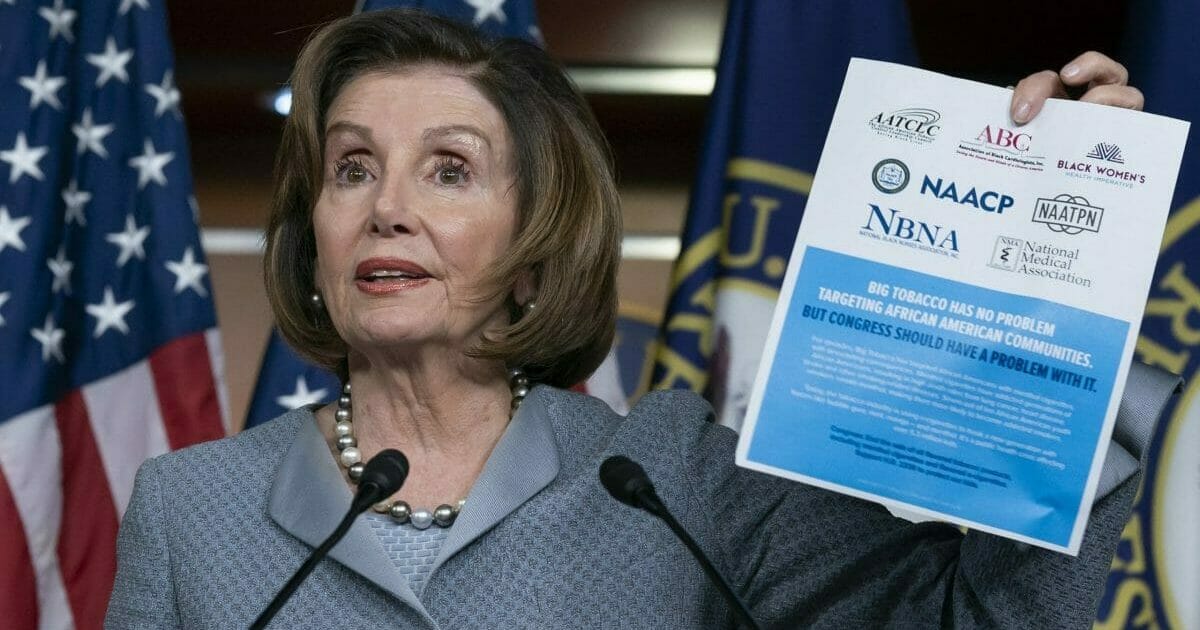
House Democrats Pass Bill Banning Flavored Tobacco Products, E-Cigarettes
The House has approved a bill to ban the sale of flavored e-cigarettes and other flavored tobacco products in a move House Democrats claim is targeted at reducing vaping among young
The bill would place new restrictions on the marketing of e-cigarettes and ban flavors in tobacco products, including menthol cigarettes. The bill also would place a new excise tax on nicotine.
The House approved the bill, 213-195, on Friday, sending it to the Senate, where approval is considered unlikely.
The White House said in a statement that President Donald Trump’s administration opposes the bill.
Supporters said the legislation provides a comprehensive strategy to reverse a teen vaping “epidemic” that officials fear is hooking a generation of young people on nicotine. In the latest government survey, more than 1 in 4 high school students reported using e-cigarettes in the previous month.
Late last year, Congress approved a law raising the minimum age to buy all tobacco and vaping products from 18 to 21 nationwide.
Opponents said the House bill went too far, noting that the new law raising the age of tobacco use has been in effect for only two months.
Some members of the Congressional Black Caucus said banning menthol cigarettes could harm black smokers. African Americans smoke menthol cigarettes at a far higher rate than the rest of the U.S. population, according to the federal Centers for Disease Control and Prevention. Marketing and promotion of menthol cigarettes is heavily targeted toward black smokers.
“White adult smokers would see little difference in their lives after this ban, while black smokers could face even more sweeping harassment from law enforcement if the hint of menthol smoke can justify a stop” by a police officer, said Rep. Yvette Clarke, D-N.Y.
“A ban that targets menthol products but ignores other premium tobacco products unduly burdens the black community,” said Clarke, whose Brooklyn district is majority African American.
Clarke invoked Eric Garner, a black New York man who died after being put in a chokehold by police officers who stopped him for selling loose, untaxed cigarettes.
“As Eric Garner’s mother knows all too well, in New York a single cigarette can become a death sentence,” Clarke said.
Supporters said the House bill would have huge health benefits for teenagers who increasingly use e-cigarettes and vape products with flavors such as mango, bubble gum and cotton candy.
E-cigarettes are battery-powered devices that typically heat a flavored nicotine solution into an inhalable aerosol. They have been pitched to adults as a less-harmful alternative to traditional cigarettes, but there is limited data on their ability to help smokers quit.
More than 6 million American middle and high school students used some type of tobacco product last year.
“Tobacco companies will not give up, but we will not, either,” said Rep. Donna Shalala, D-Fla., a former Health and Human Services secretary who co-sponsored the bill.
Vaping “is the public health crisis of the 21st century,” Shalala claimed, adding that nicotine exposure during youth and young adulthood is particularly dangerous.
Children who use flavored e-cigarettes and vaping products likely would not have taken up smoking without flavors that mask tobacco’s harshness, Shalala and other supporters said.
“It’s clear the tobacco industry has employed the same tactics that they have used for decades to hook young people on new versions of their products in order to generate new customers that will be addicted for life,” said Rep. Frank Pallone, D-N-J., the bill’s lead sponsor.
E-cigarette manufacturers such as Juul Labs use “slick product designs, glossy advertisements and sweet flavors to appeal to kids,” Pallone said. The rapid rise of vaping has reversed decades of declines in youth tobacco use, he said.
Some e-cigarettes look like regular cigarettes or cigars. Some look like USB flash drives, pens and other everyday items.
Juul Labs said in November that it was halting U.S. sales of its best-selling, mint-flavored e-cigarettes as it struggled with a nationwide backlash against vaping. The company stopped selling popular fruit and dessert flavors in stores in 2018 and stopped selling them online last year.
Rep. Greg Walden, D-Ore., said he shared Pallone’s concern about the epidemic of youth tobacco usage, but he said lawmakers also should address easy access to marijuana, citing the death of an Oregon man who used an electronic cigarette containing marijuana oil from a legal dispensary.
“Denouncing smoking tobacco in all forms while embracing the (decriminalization) or legalization of marijuana is at best inconsistent when considering long-term health outcomes,” Walden said.
The White House said in a statement this week that it opposes the bill because “it contains provisions that are unsupported by the available evidence regarding harm reduction and American tobacco use habits.”
The bill also may restrict access by adult e-cigarette users to “products that may provide a less harmful alternative” to traditional cigarettes, the White House said.
The Western Journal has reviewed this Associated Press story and may have altered it prior to publication to ensure that it meets our editorial standards.
Truth and Accuracy
We are committed to truth and accuracy in all of our journalism. Read our editorial standards.
Advertise with The Western Journal and reach millions of highly engaged readers, while supporting our work. Advertise Today.












